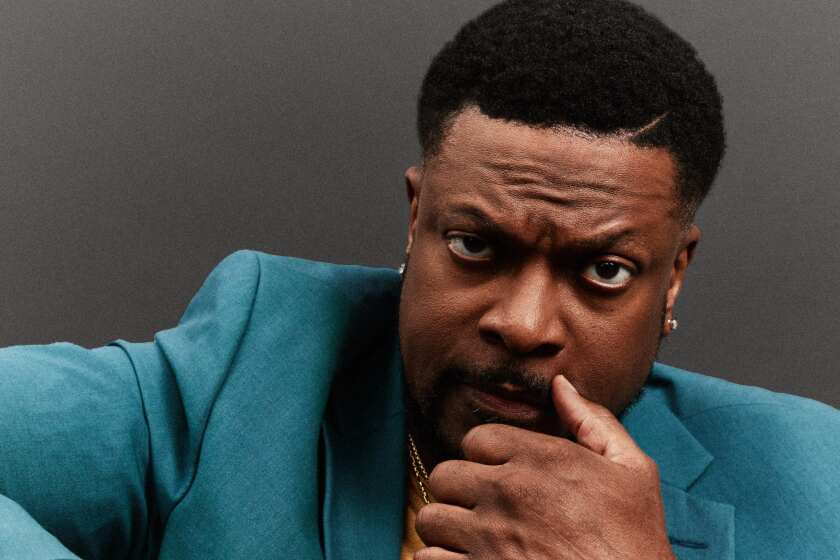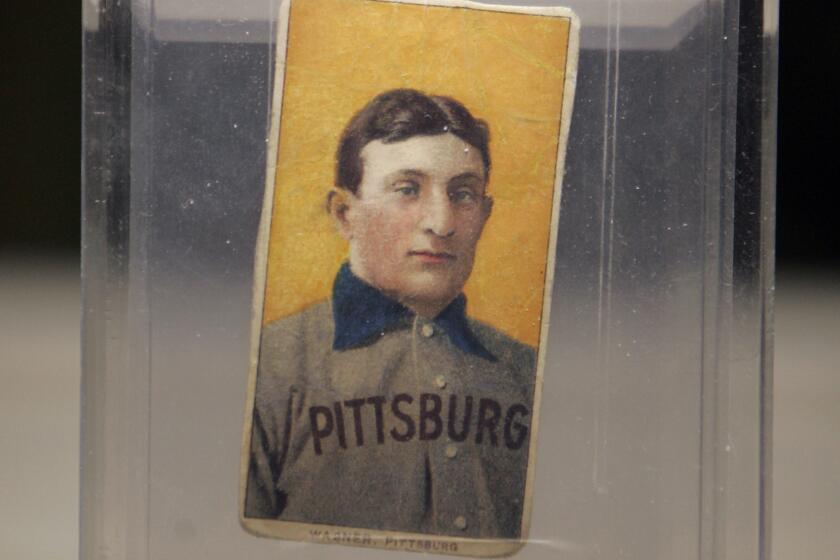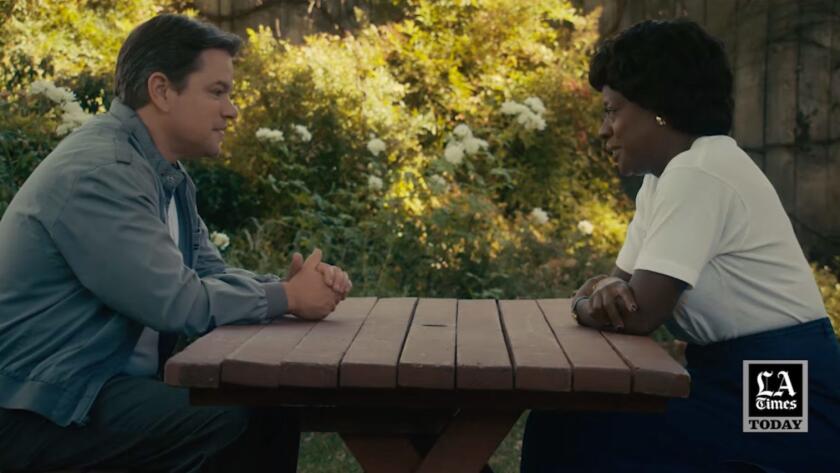Review: Ben Affleck’s entertaining Michael Jordan-Nike drama is more than hot ‘Air’
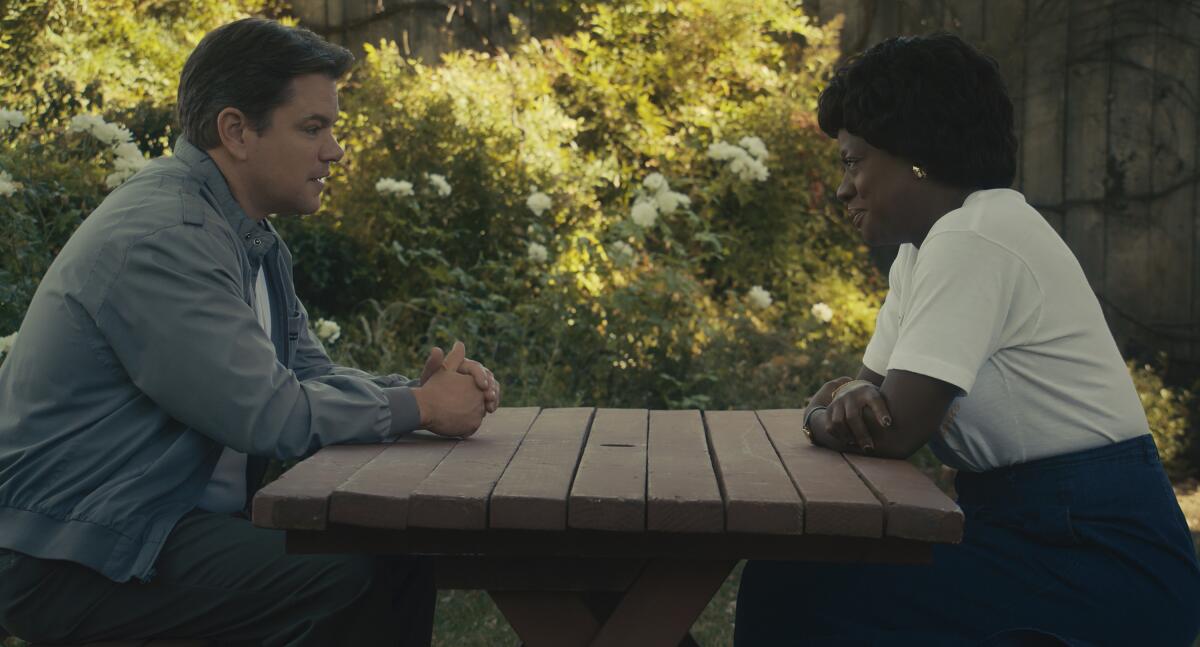
- Share via
One of the pleasures of the movies is the way they can complicate and undermine the idea of history as destiny, taking unbeatable sure things and reminding us that they were once untested, unknown quantities. It’s not, admittedly, the easiest thing for a filmmaker to pull off. Too often the clarity of hindsight can become the enemy of real drama; the more phenomenal the legend, the more inevitable and even circumscribed their success can seem. There’s a moment near the end of “Air,” Ben Affleck’s shrewd, hugely enjoyable and fitfully ruminative new movie, that deftly gets at this point, when a basketball fan opines that “everybody knew” from the beginning that Michael Jordan would be an all-timer — never mind that, sometime earlier, said fan could be heard declaring precisely the opposite.
Not that “Air” treats Jordan as some kind of underdog, or even as its central subject. An NBA rookie when the movie opens, he’s already marked for greatness — a greatness of such untouchable, godlike proportions that, beyond some TV footage of the real Jordan on the court, the movie dares not even show his face. (Damian Delano Young, the actor who plays him, appears only briefly and is almost always filmed from behind.) No, the truer underdog here — and the other legend in the making — is Nike, the upstart Oregon-based footwear company with the swoosh logo, the “just do it” slogan and an initially lackluster profile in the basketball sneaker market. That last part will change forever, of course, once Nike manages, through a campaign of extraordinary savvy and daring, to outbid and outmaneuver its deeper-pocketed rivals, Adidas and Converse, and hitch its own fortunes to Jordan’s meteoric rise.
The actor talks about scripting his ‘Air’ character, Howard White; the prospects for ‘Rush Hour 4’ and returning to ‘Friday,’ and more.
Boasting a punchy, phone-slamming, expletive-hurling, heavily Aaron Sorkin-indebted script by Alex Convery, “Air” is an ode to the art of the landmark celebrity-endorsement deal. It’s also something of a feature-length Nike commercial, albeit a deft and entertaining one. Mostly, it’s a tribute to classically American values like branding and publicity, ambition and swagger, wealth and more wealth (the Air Jordan line has earned billions and counting) and good, old-fashioned competitive cunning. Like “Argo” (2012), Affleck’s Oscar-winning hit about how Hollywood helped rescue six Americans amid the turmoil of the Iran hostage crisis, the movie dusts off decades-old headlines and invests them with the breezy urgency of a comic heist thriller, one with far lower human stakes but an incalculably higher payout. The year may be 1984, but any hint of Orwellian gloom here is dissolved in a wave of merry capitalist brinkmanship.
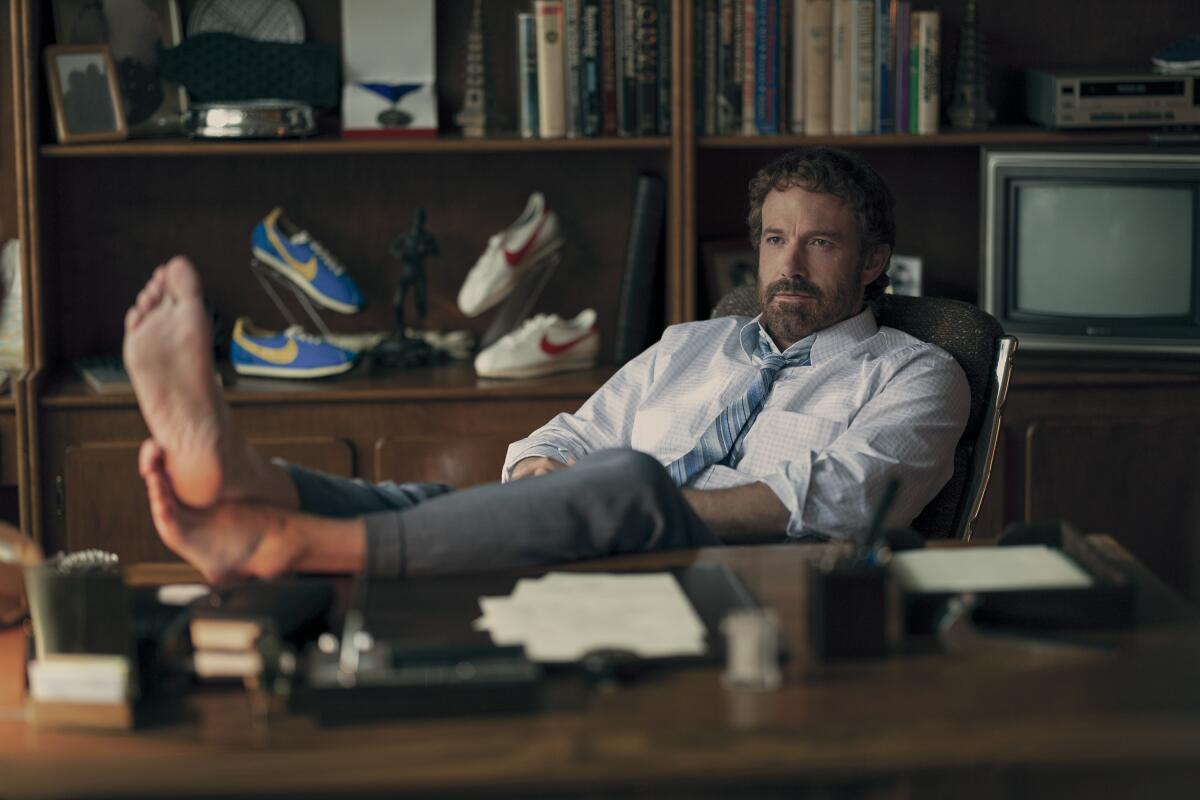
The mastermind is Sonny Vaccaro (Matt Damon, paunchy and polo-shirted), the sharpest, most stubborn mind in Nike’s flailing basketball division. Possessed of a keen understanding of the game and its players, he also has a gambler’s streak that loses him more than it earns. (His talent-scouting trips tend to detour through Las Vegas, where the script establishes his risky impulses and drops a sly beaut of a Kurt Rambis joke.) It’s Sonny who grasps and articulates the singularity of Jordan’s brilliance a few crucial beats before everyone else does. And it’s Sonny who argues that Nike, rather than dividing its annual $250,000 basketball budget among three or four lower-ranked players, should offer the whole pot to Jordan and tailor an entire shoe line to the athlete, rather than the other way around. (Matthew Maher, so good in last year’s “Funny Pages,” steals a few scenes as Nike shoe wizard Peter Moore, who designs the Air Jordan in all its prototypical Chicago Bulls red-and-black glory.)
It’s a potentially game-changing proposition — and a potentially business-killing gamble. Sonny has a lot of skeptics to convince, including Jordan, a die-hard Adidas fan, and (more importantly) Jordan’s mother, Deloris, the solid rock and gently guiding hand behind his every career move. Deloris is played, superbly, by Viola Davis, whose soft-toned, gravel-edged voice is authority itself. (In a nice touch, Davis’ husband, Julius Tennon, plays Michael’s father, James Jordan.) Two of the movie’s most beautifully written and played scenes find Sonny approaching and later negotiating with a thoughtful, quietly unyielding Deloris, setting the pattern for a story in which nearly every turning point is structured as a two-way conversation — a one-on-one master class in the art of persuasion.
When it comes to the surprising history of athlete endorsements, Nike’s pursuit of Magic Johnson in ‘Winning Time’ only scratches the surface.
Sonny’s many sparring partners include Jordan’s potty-mouthed agent, David Falk (Chris Messina, a scream), and Nike’s good-natured but beaten-down marketing director, Rob Strasser (an effective Jason Bateman). Strasser gets a poignant if overly calculated heart-tugger of a speech that kicks “Air’s” already solid dad-movie cred up several notches; he also gets one of the script’s few moments — an oblique reference to Nike’s use of Asian sweatshop labor — that puncture the feel-good corporate vibes.
Most of those vibes emanate from the company’s affable, Zen-minded CEO, Phil Knight, a wearer of track suits and spouter of Buddhist koans played by Affleck himself as the risk-averse yin to Sonny’s reckless yang. Unsurprisingly, the well-worn Matt-and-Ben screen rapport gives Sonny and Phil an instantly readable, affectionately combative dynamic, as well as an understated emotional core.
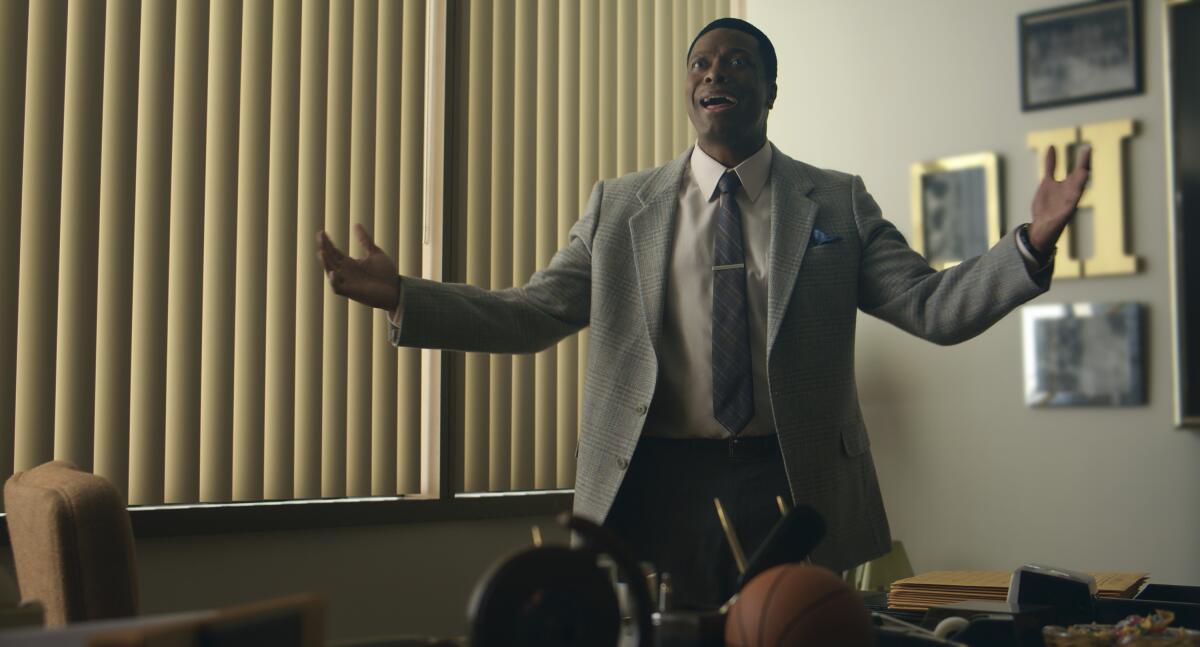
It’s not the only time Affleck uses casting to suggestive, even subversive ends. On the surface, “Air” may look like an unrepentant valentine to the ’80s, from the amusing overkill of its extended opening montage (President Reagan and Princess Diana, Ghostbusters and Cabbage Patch Kids) to its steady stream of Violent Femmes/Cyndi Lauper/Bruce Springsteen needle drops to the simultaneously spot-on and comically exaggerated ugliness of its offices, all dim greenish lighting and chunky computer hardware. (The grubbily ancient production design is by François Audouy, the cubicle-panning cinematography by Robert Richardson.) But in some ways, the movie is also carrying on a subliminal, more subtly nostalgic conversation with the ’90s, the decade that transformed Affleck and Damon into household names and saw some of their key supporting players here first rise to prominence.
The latter include Marlon Wayans, delivering a charming cameo as George Raveling, the Olympic basketball coach who would prove instrumental in persuading Jordan to sign with Nike; and Chris Tucker, funneling his motormouthed comic gusto into the smart suit and warm, welcoming vibes of Howard White, the future vice president of the entire Jordan brand. In ways that sometimes register more potently than the action or dialogue, “Air” is haunted by the specters of these actors’ career highs and lows; this is Tucker’s first movie in seven years. It’s also haunted by the sight of Affleck and Damon, two aging Hollywood golden boys who at times seem to be confronting their own mortality alongside their characters. They’ve made a movie about the ravages of time, the fleeting, sometimes arbitrary nature of fame and the general rule of failure to which success proves an all-too-rare exception.
This meta-melancholy subtext rises to the surface late in the movie, when Sonny delivers a deal-clinching, throat-tightening boardroom speech about how few legacies endure and how few legends are remembered. It’s a message that consoles and stings, not least for the way it seems to knock even movie royalty down a few pegs. Success and fame on the level of a Michael Jordan, Sonny reminds us, has a way of throwing even great accomplishments into perspective.
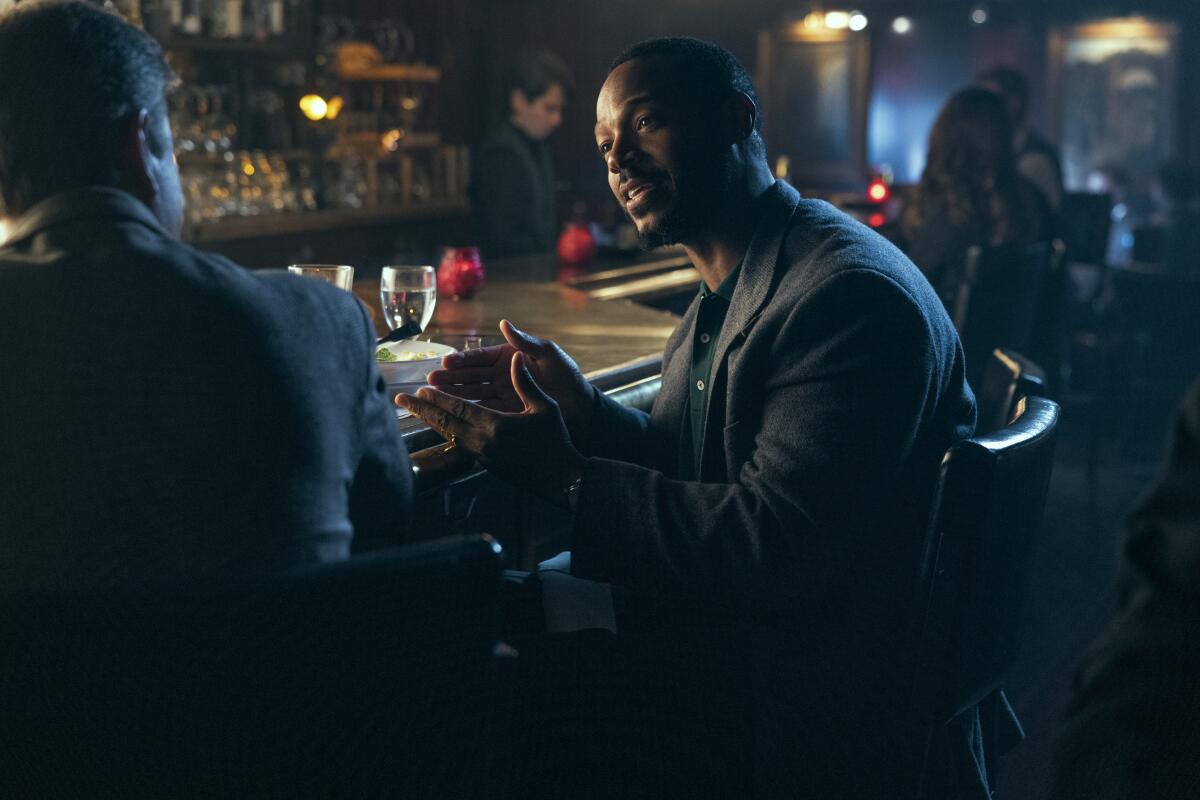
“Air” comes by these ideas honestly and thoughtfully, and they’re rich enough that you sometimes wish Affleck and Convery had given them freer, unrulier reign, rather than shoehorning them (so to speak) into all the story’s busily, efficiently moving parts, its blue Slurpee sight gags and Adidas-skewering Hitler jokes. Crucially, it’s in the scenes with Wayans, Tucker and Davis that the movie engages meaningfully, if too briefly, with the role of race in the overlapping arenas of sports, celebrity and social progress, and especially the question of what Black athletes are owed by an industry that uses their names, likenesses and talent to invest a product with meaning.
Unsurprisingly, it’s Deloris who brings these issues to the fore — and also cuts through them with clean, unerring logic — when she argues for a fundamental shift in the balance of power between her son and Nike, and by extension between all athletes and the companies seeking to trade on their fame. The movie is on her side — or rather, it pivots to her side at just the right moment, pulling the rug out from under Sonny and his colleagues and also, perhaps, from under itself. In these earnest, cheer-worthy moments, “Air” almost convinces you that it’s more than just a feel-good celebration of capitalism and corporate power, that it has its eye not just on the prize but on the entire game — and that it’s looking out for all the underdogs as fervently as it wants you to believe.
'Air'
Rating: R, for language throughout
Running time: 1 hour, 52 minutes
Playing: Starts Wednesday in general release
——————
- Share via
Watch L.A. Times Today at 7 p.m. on Spectrum News 1 on Channel 1 or live stream on the Spectrum News App. Palos Verdes Peninsula and Orange County viewers can watch on Cox Systems on channel 99.
More to Read
Only good movies
Get the Indie Focus newsletter, Mark Olsen's weekly guide to the world of cinema.
You may occasionally receive promotional content from the Los Angeles Times.
